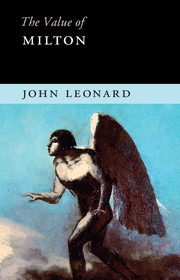Book contents
- Frontmatter
- Dedication
- Contents
- Preface
- Textual note
- 1 Areopagitica, toleration and free speech
- 2 The minor poems and ‘the power / to save’
- 3 The political prose: ‘in liberty's defence’
- 4 Paradise Lost, the sublime poem
- 5 Paradise Lost, ‘solid good’
- 6 Paradise Regained, ‘To the utmost of mere man’
- 7 Samson Agonistes, tragedy and terror
- Notes
- Index
5 - Paradise Lost, ‘solid good’
Published online by Cambridge University Press: 05 July 2016
- Frontmatter
- Dedication
- Contents
- Preface
- Textual note
- 1 Areopagitica, toleration and free speech
- 2 The minor poems and ‘the power / to save’
- 3 The political prose: ‘in liberty's defence’
- 4 Paradise Lost, the sublime poem
- 5 Paradise Lost, ‘solid good’
- 6 Paradise Regained, ‘To the utmost of mere man’
- 7 Samson Agonistes, tragedy and terror
- Notes
- Index
Summary
One of the reasons why Paradise Lost is a great poem is that it has a great name. The name antedates the poem. It was one of three titles Milton considered in the 1640s for a prospective (and never written) tragedy. At first he seems not to have realized how good the name was, for in his manuscript drafts for this tragedy (now at Trinity College, Cambridge) he changed ‘Paradise Lost’ to ‘Adam's Banishment’ and then ‘Adam Unparadised’. Fortunately, he returned to his original choice for the epic he wrote. All three titles tell us what action will be depicted, but ‘Paradise Lost’ does so much more. Its haunting power comes partly from the fact that it is an oxymoron. Paradise should be the opposite of loss, yet as soon as Milton offers Paradise, he takes it back. Even readers who have never read the poem respond to that evocative pairing ‘Paradise Lost’. It speaks to a shared human need, which is why it has so often been appropriated (for novels, television shows, newspaper headlines, even a heavy metal band). This need provides the best answer to those who dismiss Milton's subject as irrelevant. Michael Wilding makes the point well. The poem is not (as Raleigh had claimed) ‘a monument to dead ideas’. Its issues ‘are of all time. Why is there suffering? How did evil originate? Why do ideal societies fail? What is justice? How can things be improved?’
The title tells us where to look for the value of this great poem. It is about Paradise and its loss. Milton's declared aim is to ‘justify the ways of God to men’ (1.26), but it is a moot point whether he achieves that goal and a moot point whether he needs to. Strong arguments have been made both for and against the success of the poem's theodicy (justification of God), but I shall not examine them closely, since my emphasis is on what Milton's readers can share, not on what divides us. The chief obstacle that Milton faced in justifying God was God's pettiness. Satan makes the case against God succinctly when he assures Eve that a good God would never act on his threat to kill her for eating an apple: ‘will God incense his ire / For such a petty trespass?’ (9.692–3).
- Type
- Chapter
- Information
- The Value of Milton , pp. 85 - 105Publisher: Cambridge University PressPrint publication year: 2016

